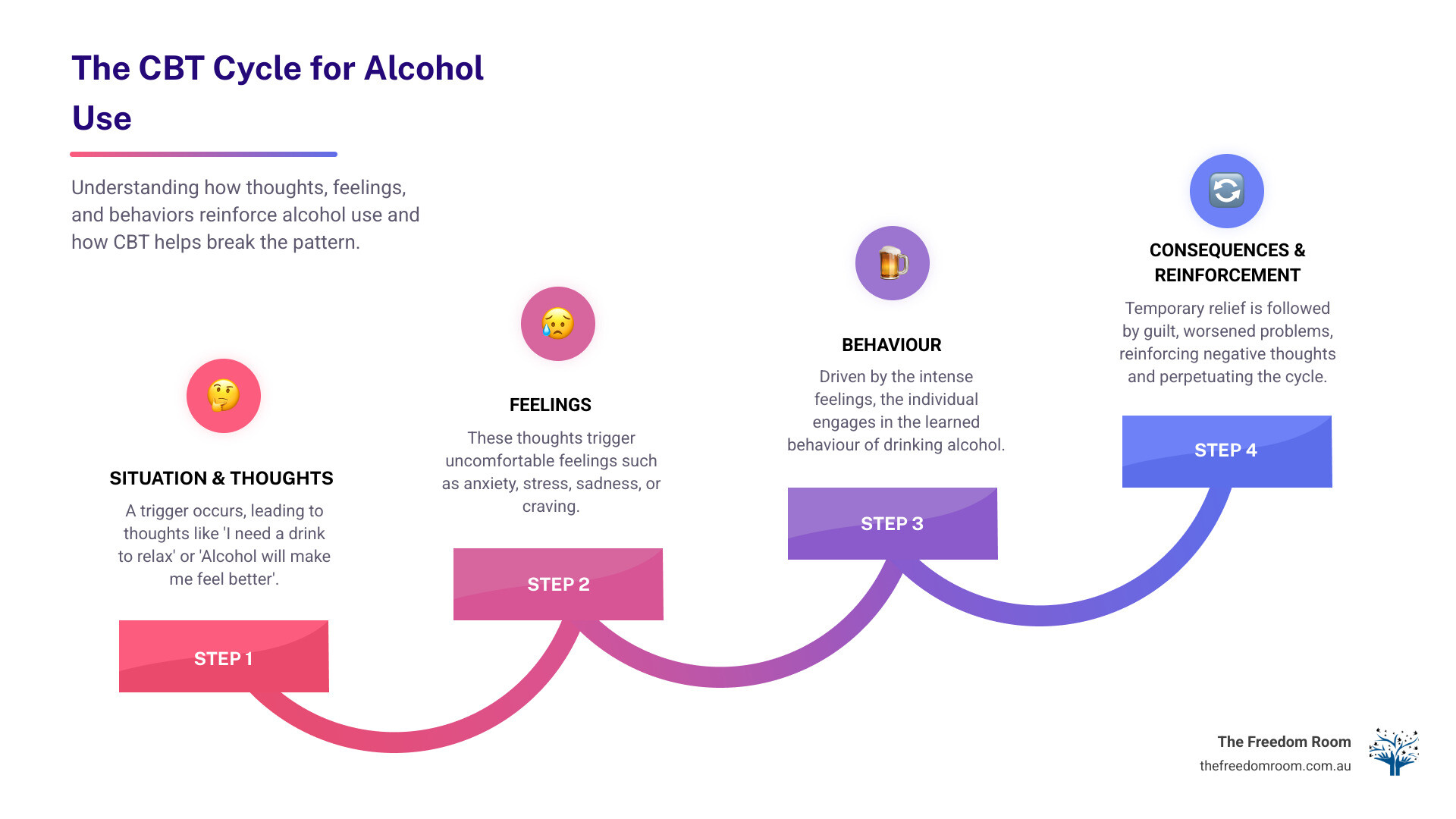Understanding Alcohol Use Disorder and the Role of Therapy
An Evidence-Based Framework for Change
Cognitive behavioural therapy alcohol treatment is an evidence-based approach that helps individuals overcome alcohol dependence by changing unhelpful thinking patterns and learned behaviours. This therapy offers a structured, practical way to manage drinking habits.
Key Features of CBT for Alcohol Use
- Structured methods for understanding and modifying drinking behaviours
- Development of skills to identify triggers and manage cravings
- Application of techniques to challenge thoughts that promote alcohol use
- Implementation of strategies for relapse prevention and long-term sobriety
- A goal-oriented structure, typically comprising 5 to 20 sessions
- Flexible delivery formats, including individual, group, or digital sessions
The CBT Perspective on Alcohol Use Disorder
Alcohol use disorder is a significant issue for many Australians, often creating a cycle of stress and dependency. Individuals may use alcohol to cope with difficult emotions, which can exacerbate existing problems. However, recovery is possible with appropriate therapeutic support.
Cognitive behavioural therapy is a scientifically supported treatment for alcohol use disorder. CBT conceptualises problematic drinking as a learned behaviour that can be altered with healthier coping strategies, contrasting with perspectives that view it as an unchangeable condition.
Efficacy and Long-Term Benefits
Research demonstrates that CBT equips individuals with practical skills to manage urges and challenge negative thoughts, facilitating lasting change. Studies indicate that CBT can increase the number of days abstinent from alcohol by over 50% during the treatment period, with benefits often persisting long after therapy has concluded.
This guide provides an overview of cognitive behavioural therapy for alcohol use, outlines the treatment process, and explains how it can support the development of an alcohol-free lifestyle.

The Foundations of Cognitive Behavioural Therapy for Alcohol
The Connection Between Thoughts, Feelings, and Actions
Cognitive behavioural therapy alcohol treatment is founded on the principle that thoughts, feelings, and actions are interconnected. In the context of alcohol dependency, unhelpful patterns in one area can initiate a reinforcing cycle. For example, a stressful event may trigger the thought, “I need a drink to cope,” which in turn generates feelings of anxiety and leads to the behaviour of drinking. The temporary relief experienced reinforces this cognitive pattern, perpetuating the cycle. CBT provides a framework for recognising and interrupting these established patterns.
Core Principles of CBT
CBT operates on two core principles. First, it posits that many psychological challenges originate from unhelpful or distorted ways of thinking. These may manifest as automatic negative thoughts or deeply held beliefs, such as the perceived necessity of alcohol for socialising or relaxation. Although these thoughts may feel valid, they are often cognitive distortions that sustain problematic behaviours.
The second principle is that problematic behaviours are learned patterns. The use of alcohol as a coping mechanism for stress or boredom can become an automatic response over time. CBT offers practical tools to identify and modify these learned thoughts and behaviours through the re-evaluation of distorted thinking and the development of effective problem-solving skills. Mastery of these skills enhances self-efficacy, which is essential for sustained recovery.
Integrating Emotional Freedom Techniques (EFT)
Some therapeutic approaches integrate Emotional Freedom Techniques (EFT), also known as tapping, with CBT. EFT addresses the body’s physiological stress response. During stress, the amygdala can trigger a ‘fight, flight, or freeze’ response. The technique involves gentle tapping on specific acupressure points while focusing on a distressing thought, which sends a calming signal to the amygdala.
This process can disrupt the typical stress response and help the nervous system return to a state of equilibrium. For alcohol use challenges, EFT may be beneficial for:
- Reducing the intensity of cravings and urges.
- Managing anxiety and stress that trigger drinking.
- Processing underlying emotional trauma that contributes to addictive behaviours.
Combining CBT’s cognitive strategies with EFT’s emotional regulation techniques can foster greater inner calm and resilience.
The Unique Approach of CBT for Alcohol Use
What makes cognitive behavioural therapy alcohol treatment stand out is its practical, present-focused, and skills-based methodology. Rather than concentrating on past events, the therapy addresses the current thoughts, feelings, and behaviours that contribute to alcohol use. Clients learn tangible strategies for immediate application.
A key aspect of this approach is its emphasis on internal skills development. The therapy equips individuals with a toolkit of coping mechanisms to navigate challenges independently long after formal sessions conclude. This fosters the self-awareness and resilience crucial for sustained recovery.
Scientific research strongly supports this approach. Studies have shown that CBT is significantly more effective than many traditional approaches, with interventions based on behavioural science. Unlike models that frame addiction as a permanent condition, CBT views problematic drinking as a learned behaviour that can be replaced with healthier patterns, highlighting an individual’s capacity for change.
Core Techniques of CBT for Alcohol Use
The Importance of Active Participation
The effectiveness of cognitive behavioural therapy alcohol treatment is contingent on active client participation. Similar to acquiring any new skill, consistent practice is essential. Therapists often provide assignments for completion between sessions, offering opportunities to apply learned concepts to real-life situations. This practice helps to solidify new behaviours and thought patterns.
Functional Analysis and Self-Monitoring
To modify a behaviour, it must first be understood. A foundational step in cognitive behavioural therapy alcohol treatment is developing an awareness of the patterns surrounding alcohol use. Clients are guided to observe the specific triggers, situations, and emotions that precede drinking.
A helpful framework for this analysis is the ABC model:
- Antecedent: The event immediately before the urge to drink (e.g., a stressful meeting, an argument).
- Behaviour: The act of drinking, as well as thoughts about drinking or actions taken to get alcohol.
- Consequence: The immediate effects (e.g., temporary stress relief) and the longer-term impacts (e.g., guilt, worsening problems).
By tracking alcohol use, often through journaling, specific patterns can be identified. This self-awareness provides valuable insights for developing targeted interventions.
Cognitive Restructuring for Negative Thought Patterns
Thoughts significantly influence behaviour. In the context of alcohol use, unhelpful thinking patterns can serve to justify drinking or undermine efforts to change. These automatic thoughts, or cognitive distortions, can feel true but are often inaccurate.
Common distortions include all-or-nothing thinking (e.g., viewing one drink as a complete failure) or catastrophising (e.g., believing manageable stress is unbearable without a drink). Through cognitive restructuring, clients learn to recognise and challenge these thoughts. The process involves examining the evidence for and against a belief and exploring alternative perspectives or coping methods. This helps in developing more balanced and realistic thinking that supports recovery.
Behavioural Skills Training
Cognitive behavioural therapy alcohol treatment also equips individuals with practical skills to manage challenging situations. These behavioural strategies provide concrete tools for handling urges and responding effectively when cravings arise.
Key Behavioural Strategies
Key skills include:
- Stimulus control techniques: Identifying and then modifying or avoiding situations, people, or places that trigger urges to drink.
- Drink refusal skills: Practising assertive communication to decline alcohol in a manner that feels authentic, often through role-playing exercises in sessions.
- Problem-solving for high-risk situations: Proactively identifying challenges, such as a wedding, and developing a specific plan to manage them.
- Mindfulness and emotion regulation: Utilising mindfulness to observe urges without acting on them. Techniques like Emotional Freedom Techniques (EFT) can be powerful in calming the nervous system and reducing the intensity of cravings.
These skills are practised during sessions and applied in daily life to build confidence and the capacity for sustained sobriety.
The Structure of a CBT Programme for Alcohol Use
A cognitive behavioural therapy alcohol programme typically follows a structured, phased approach. It is a time-limited and goal-focused process, generally lasting between 5 and 20 sessions. The treatment plan is personalised to address the client’s specific needs and objectives.
Phase 1: Assessment and Goal Setting
The process begins with a comprehensive assessment conducted in a safe, non-judgemental environment. The therapist explores the client’s history of alcohol use, consumption patterns, and triggers to understand the underlying factors contributing to the behaviour. This includes identifying any co-occurring challenges, such as anxiety or depression.
Following the assessment, clear, collaborative goals are established. Whether the objective is complete abstinence or reduced consumption, success is defined according to the client’s aims. These realistic and measurable goals form the foundation of the personalised treatment plan.
Phase 2: Acquiring and Practising New Skills
This phase concentrates on learning and applying core CBT techniques. The client builds a personal toolkit of strategies to manage urges, challenge unhelpful thoughts, and navigate difficult situations without alcohol.
Practice is essential for the efficacy of these skills. Sessions may involve role-playing to rehearse responses to triggers. Between-session assignments, such as journaling or practising specific techniques, help integrate these new skills into daily routines. This consistent application solidifies new habits and builds lasting confidence.
Phase 3: Relapse Prevention and Long-Term Maintenance
As progress is made, the focus shifts to maintaining changes over the long term. This final phase equips the client with strategies for sustained recovery. Key components include identifying high-risk situations and developing a personal relapse prevention plan. This plan outlines specific steps to take if cravings arise, including helpful coping skills and support contacts.
The programme also continues to build resilience for managing life stressors without relying on alcohol. The ultimate goal is to empower the individual to manage their recovery independently. For more on this, visit our page on Cognitive Therapy for Alcoholics.
Effectiveness and Delivery Formats of CBT for Alcohol Use
When considering treatment for alcohol use disorder, understanding the evidence of effectiveness is important. The evidence for Cognitive behavioural therapy alcohol treatment is compelling, with decades of research demonstrating its success. The adaptability of CBT also allows it to be customised to different needs and delivered in various formats.
How Effective is CBT for Alcohol Use Disorder?
CBT is one of the most rigorously tested psychotherapeutic treatments for alcohol use disorder. Its effectiveness is supported by extensive scientific research. CBT achieves strong results by systematically addressing the underlying thought patterns and behaviours that drive alcohol use. By changing these core mechanisms, individuals develop lasting skills.

Research comparing treatment approaches has shown that Cognitive behavioural therapy alcohol interventions are significantly more effective than some traditional methods. Therefore, selecting evidence-based interventions that have been thoroughly researched is crucial.
Statistics from recent research are encouraging; one clinical trial found that participants receiving digital CBT increased their days abstinent by more than 50% over an eight-month period. This highlights the capacity of CBT to build long-term coping skills. At The Freedom Room, we are committed to providing Evidence-Based Alcohol Treatment backed by science.
The Rise of Digital CBT
Digital CBT has emerged as an effective and accessible option for treating alcohol use disorder. This approach utilises web-based programmes or mobile applications to deliver CBT modules, increasing the availability of treatment.

Advantages of Digital CBT
Digital CBT offers several advantages. It improves access for individuals in regional areas across Australia, including Queensland. It also provides flexibility for those with demanding schedules or mobility challenges and ensures consistent delivery of the evidence-based curriculum.
Efficacy of Digital Formats
Research supports the effectiveness of digital CBT. One study demonstrated that participants’ average percentage of days abstinent rose from 47.6% to 75.1% during treatment. Hybrid approaches that combine digital tools with clinician monitoring represent an effective option for our Alcohol Use Disorder Treatment.
Benefits and Considerations of CBT
When evaluating cognitive behavioural therapy alcohol treatment, it is useful to understand both its benefits and the commitment it requires. This allows for an informed decision regarding the recovery process.
Key Advantages of Choosing CBT
CBT offers several advantages that establish it as a highly effective approach for alcohol use disorder.
- Evidence-based and structured: The therapy is supported by decades of scientific research and provides a clear, step-by-step process.
- Teaches lifelong skills: The techniques learned for managing cravings and regulating emotions are transferable to other areas of life.
- Addresses co-occurring issues: CBT is effective for treating interconnected challenges such as anxiety and depression alongside alcohol use.
- Highly adaptable: The therapy can be customised to individual needs and delivered in one-on-one, group, or digital formats.
- Builds self-efficacy: Through active participation, individuals learn they have the capacity to change their thoughts and behaviours, which is a cornerstone of sustained sobriety.
Potential Limitations and How to Address Them
While highly effective, certain considerations are important. CBT requires active participation and commitment, including the completion of between-session assignments and the practice of new skills. This can be a demanding process, but therapists work to make the tasks engaging and relevant to the client’s goals.
The therapeutic work can be emotionally challenging as it involves confronting difficult thoughts and feelings. It is not uncommon for individuals to experience a temporary increase in distress before improvement occurs. A supportive therapeutic environment, potentially incorporating techniques like EFT, can help clients process these emotions safely.
Finally, finding a qualified and compatible practitioner is crucial for a positive outcome. An effective therapist understands the science of CBT and can establish a strong therapeutic alliance built on trust and empathy.
Conclusion: A Path Toward Recovery
You have a thorough understanding of how cognitive behavioural therapy alcohol treatment can support recovery. This evidence-based approach facilitates change by building practical skills and self-awareness.
Recovery from alcohol use disorder is a manageable process with the appropriate therapeutic tools. CBT offers not only strategies to cease or reduce drinking but also a deeper understanding of the links between thoughts, feelings, and actions. Modifying these patterns helps to build a foundation for lasting emotional resilience.
The integration of complementary techniques, such as EFT, can further address both the cognitive and emotional aspects of addiction by providing methods to manage cravings, stress, and the emotional impact of past experiences.
Seeking professional support is a critical step toward recovery. A compassionate and non-judgemental therapeutic relationship is essential for progress. Services are available throughout Australia, including in locations like Strathpine, QLD, to assist individuals ready to address their relationship with alcohol.
For more information, explore our Therapy for Alcohol Addiction services or connect with our team for dedicated Addiction Counselling. Your journey to lasting recovery starts here.

